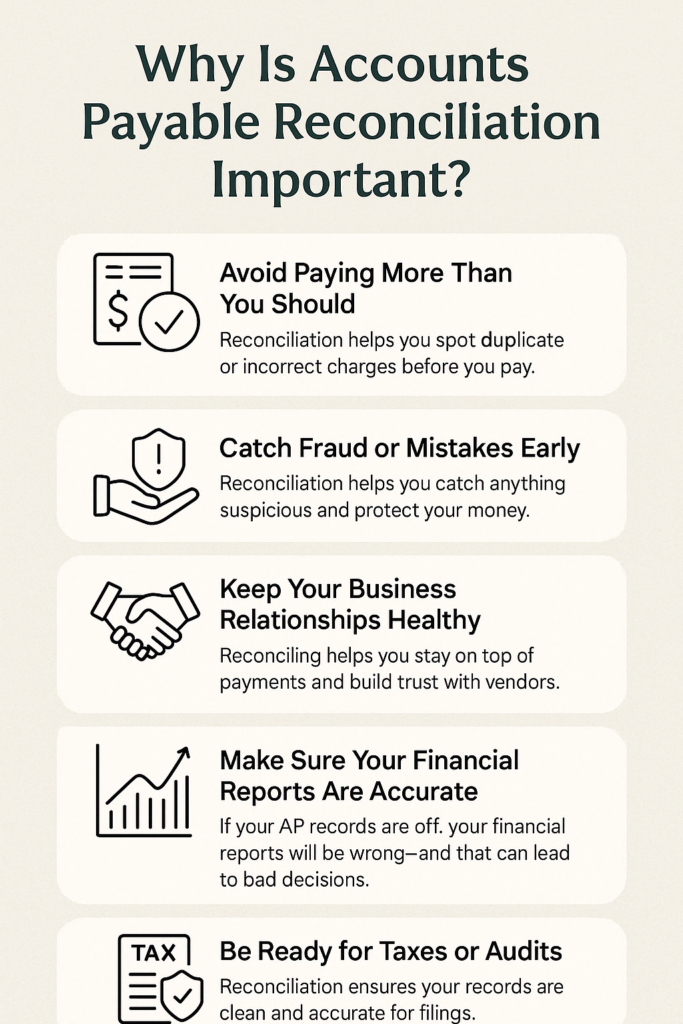Discover how accounts payable reconciliation can save your business time, prevent fraud, and ensure financial accuracy. Learn the steps, tools, and best practices for effective AP reconciliation.
Table of Contents
Introduction: Why Accounts Payable Reconciliation Matters
Accounts payable reconciliation might not sound glamorous, but for businesses of all sizes, it’s an essential financial process. Without it, errors in vendor payments, duplicate invoices, and even fraud can slip through the cracks. This guide will show you exactly how to master AP reconciliation, why it’s crucial, and the tools top businesses use to streamline it.
1. What Is Accounts Payable Reconciliation?
Accounts payable (AP) reconciliation is the process of comparing your company’s internal records (like your accounts payable ledger) against external documents (like vendor statements or invoices). The goal is to ensure that all payments, invoices, and records match up correctly.
First, let’s break it down:
- “Accounts Payable” = Money your business owes to other people (usually vendors or suppliers).
- Think of it like this:
You order products or services for your business → The supplier sends you a bill (invoice) → You need to pay that bill later.
So, accounts payable is basically your unpaid bills that you plan to pay soon.
Reconciliation means checking that your records match — like comparing your notes with someone else’s notes to make sure you both have the same answers.
In this case, you’re comparing:
- Your internal list of what you think you owe (your company’s books)
- With what your vendors or suppliers say you owe (their invoices/statements)
Think of it as financial double-checking.
If there are discrepancies, you catch and correct them before they cause major issues.
2. Why Is It Important Accounts Payable Reconciliation?
Here’s why AP reconciliation is non-negotiable:
- ✅ Avoid Overpayments or Duplicate Payments
- ✅ Detect Fraud or Unauthorized Charges Early
- ✅ Maintain Good Vendor Relationships
- ✅ Ensure Accurate Financial Reporting
- ✅ Stay Audit-Ready
Here are 5 simple but powerful reasons why this matters:
1. Avoid Paying More Than You Should
Imagine you got billed twice for the same delivery, or someone accidentally added an extra zero.
If you don’t double-check, you might overpay, and that’s money lost.
🧠 Reconciliation helps you spot duplicate or incorrect charges before you pay.
2. Catch Fraud or Mistakes Early
Let’s say someone sends a fake invoice pretending to be your vendor — or there’s a typo in the amount you owe.
Without checking, you might pay the wrong person or the wrong amount.
🔐 Reconciliation helps you catch anything suspicious and protect your money.
3. Keep Your Business Relationships Healthy
If you miss a payment or pay the wrong amount, your supplier might stop doing business with you — or charge late fees.
🤝 Reconciling helps you stay on top of payments and build trust with vendors.
4. Make Sure Your Financial Reports Are Accurate
Your business decisions depend on knowing exactly how much money you owe and how much you’ve spent.
📊 If your AP records are off, your financial reports will be wrong — and that can lead to bad decisions.
5. Be Ready for Taxes or Audits
When it’s time to file taxes or get audited, your records must be clean and accurate. Reconciliation makes sure everything adds up correctly.
🧾 This can save you stress, time, and legal trouble later.
🟩 Simple Example:
Let’s say:
- You ordered 10 office chairs
- The vendor billed you $500
- You wrote it down as $800 by mistake
If you don’t reconcile, you might pay $800 instead of $500. That’s $300 wasted — just from a small mistake.
But if you reconcile, you’ll catch the error and fix it before paying.
Inconsistent AP records can lead to financial statements that don’t reflect the true health of your business. That’s a red flag for investors, auditors, and internal stakeholders.

3. Step-by-Step Process for AP Reconciliation Accounts Payable Reconciliation
Here’s a simple workflow:
Step 1: Gather Documents
- Vendor statements
- Internal AP ledger
- Invoices and payment records
Step 2: Match Entries
- Match invoices with vendor statements and payment confirmations.
Step 3: Identify Discrepancies
- Look for missing invoices, incorrect amounts, or duplicated entries.
Step 4: Investigate and Resolve Issues
- Contact vendors for missing or incorrect documentation.
- Adjust entries in your books accordingly.
Step 5: Document Everything
- Keep a record of reconciliations for future audits or reviews.
4. Common Mistakes to Avoid Accounts Payable Reconciliation
- Ignoring small discrepancies (they can snowball!)
- Not reconciling regularly (monthly is ideal)
- Relying too heavily on manual processes
- Poor communication between departments
5. Best Tools for AP Reconciliation
Here are some tools that top businesses use:
- QuickBooks (great for small to mid-size businesses)
- Xero (user-friendly with good automation features)
- SAP or Oracle NetSuite (ideal for larger enterprises)
- Tipalti (automation + global payments)
- Zoho Books (affordable and efficient)
These tools help reduce human error, speed up the process, and improve overall financial accuracy.
6. Tips from Finance Experts Accounts Payable Reconciliation
- “Automate as much as possible, but always verify the data.” – CFO, SaaS Company
- “Don’t wait until the end of the month – review transactions weekly.” – AP Manager, E-commerce Retailer
- “Create a checklist and standard operating procedure (SOP) for consistency.” – Bookkeeping Consultant
7. Final Thoughts: Make Reconciliation a Habit, Not a Headache
Accounts payable reconciliation isn’t just a finance task – it’s a strategic process that can save money, build trust with vendors, and keep your business financially healthy. By following best practices, using the right tools, and making it a regular habit, you’ll gain better control over your company’s cash flow and accounting integrity.

